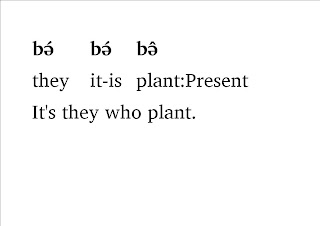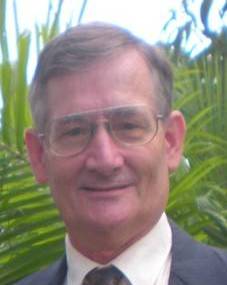10/30/2010
10/29/2010
Phonological analysis in Swo

As you can see in the accompanying table, there is complementary distribution between one sound and another in Swo.
The conditioning environment is a following vowel that is "close", as is the case of /i/, in the front of the oral cavity, /ɨ/, in the center of the oral cavity, and /u/, in the back of the oral cavity.
A sound followed by such a close vowel must be strident or fricative, while the sound before the open or semi-open vowels is a simple stop.
The allophones of /p/ are [f] and [p].
The allophones of /b/ are [v] and [b].
The allophones of /t/ are [t] and [ts].
The allophones of /d/ are [d] and [dz].
The allophones of /k/ are [kf] and [k].
The allophones of /g/ are [gv] and [g].
10/28/2010
Swo Transition Primer Underway

The Reverend Ossimba says he wants to do the work of writing the first pedagogical book in Swo, their "transition primer".
It will be used by Swo who are literate in French.
The first page done is shown here.
Pastors Meeting
Pastor OSSIMBA Simon Pierre wants to meet with the other Swo Pastors next month to see what they are proposing to do concerning the Swo language and Bible translation project. It is good that he sees that their contributions are needed.
10/25/2010
Swo Grammar

Just as unwritten languages have organized systems of sound and meaning (or "phonologies"), they also have complete and complex grammars, in which words exemplify a part of speech and these words are ordered in a complex way.
The sentence shown here made my Swo colleague smile. He said that it is as though he was stammering.
The Swo Need to Understand the Gospel Songs
Pastor Ossimba also said that adults in the church sing Bulu songs that they have no understanding of. They are singing everything with as little comprehension as English speakers when they sing "Kumbaya." How many think it must mean "come by us"? Who can parse it and explain its meanings and applications to a life lived on the edge? The Swo who sing Bulu are in the exact same position as we are singing Kumbaya. They are incapable of translating their Bulu hymns or of feeding their thirsty souls on the meaning held within. But we know that the German nation was as much transformed by the hymns Luther wrote as by anything else he did. The will of God is that they should be worshiping God in their hearts and with their minds. "Let the word of Christ dwell in you richly, teaching and exhorting one another with all wisdom, singing psalms, hymns, and spiritual songs, all with grace in your hearts to God." Col. 3:16 (ESV)
The Swo Need the Gospel
Pastor Ossimba explains why the Gospel is needed among the Swo in their language. The first reason is that they don't understand Bulu well enough and the other is that they are so poorly taught through that language that they get the wrong meaning as often as the right one. During a Christmas service, Swo children were asked to recite verses from the Bible, and one chose the passage about the baby Jesus being laid in the manger "where animals ate their food". The child, speaking in Bulu, something quite different, that he was laid in the manger "where the cattle killed and ate people." The Pastor surmised that the children probably thought that surviving the evil cattle was Christ's first miracle.
The Stolen-and-Returned Computer in for Maintenance
It is true! The Toshiba XP laptop that had been stolen and then returned is back! Unfortunately, it needs some antivirus protection and it needs to be cleaned of viruses. The hard drive sounds a bit "off", too, so maybe it needs replacing? Francois Medjo asked Brigitte, the head of the Nzime Language Academy, to drop it off. We are very grateful for God's protection of the laptop and the way the computer services department can help us. The head of the department is David Anderson. He is a valued participant in the Bible translation movement. We use Eset antivirus, which now costs as little as $8.25 per PC per year. When we send the new virus definitions out to our coworkers, they protect their computers up the the same level as ours in the capital. The laptop needed a new hard drive and a thorough cleaning out of the accumulations of dust. It is now getting ready for serious work again.
Labels:
antivirus software,
David Anderson,
Kaspersky,
stolen computer
10/23/2010
Institutions for the Swo Bible Translation Movement
The Swo people have institutions such as political parties, chiefs, savings societies and such, but they will soon require two more. The reason for this is that they are engaging in two new activities: (A) translating and engaging the Word of God and (B) learning to read and write in Swo. The first activity involves all those who call themselves Christian. They need not all be speakers of Swo, since everyone can pray. The work of translating God's Word and being fed and renewed by it is the work of the Church and it must therefore be the case that an inter-church committee takes shape to execute its work under the leading of the Holy Spirit. Ecumenism is rarely seen in the absence of Bible translation. (I have read this but lost the reference.) The creation of the Swo interchurch Bible translation and Scripture-Use committee is being attended to by a Presbyterian pastor, the Reverend Simon Pierre Ossimba. Its organizational meeting should take place in the first week of November. The second activity involves all those who speak Swo and want to be able to engage with others across the printed page. Imagine not being able to hear from those of another time or place! A language committee has been in the process of being created for 3 years, but without an alphabet or orthography statement, they have been unable to proceed. Now they have at least some of these resources and will begin assuming on their roles.
10/22/2010
Becoming Literate in Swo
Swo is a well-developed language, by which I mean that its speakers find no problem in dealing with all the issues of life without recourse to other languages. It has a "mature" morphological system, both for nouns and verbs, as well as a highly complex and structured sound-system. That does not mean the speakers can write it, however. I know one speaker who has tried to write personal names in the language and gotten all tangled up in writing the phonetic form of the language rather than its phonemic form. He has not proceeded very far. Others have tried to use the writing system of Bulu. That, too, has been frustrating. In order to help show the Swo people the path forward, we have made a 1-page "alphabet chart" that shows the letters in alphabetical order on one sheet of paper. For each letter, there is a word that exemplifies the use of the letter, and an illustration of the word. Its enduring virtue will be serving as publicity for the innovation, written Swo. It also helps desensitize people to the "funny" characters. This teaches them the number and identity of the characters in their language, and their order in the Swo alphabet, but it is not otherwise pedagogically useful. For them to become literate, however, we will have to write primers for the various audiences: a primer series for complete illiterates and a slim and simpler volume those who are literate in French or in Bulu but who want to read and write Swo. This is a transition primer. We have organized its contents and will be now starting on the first lessons.
Labels:
Alphabet Chart,
literacy,
literacy materials,
sso,
swo
10/21/2010
Table of Contents for the Upcoming Swo Transition Primer

This is the table of contents for the transition primer that we are planning to write. It is a much smaller one than was needed for the Nzime and for the Badwe'e, owing to the smaller inventory of phonemes and graphemes. Since we are using a phonemic orthography, we spare ourselves the need of teaching the use of allophones.
For example, we teach "d" in radical initial position and use it in radical-medial position, where it has the sound of "r". Were we to use the lettre "r" in that position, we would have been obliged to teach its use in a separate lesson from the lesson on "d".
10/20/2010
10/19/2010
Swo Definite Article Following Relative Clauses

The Swo have a very understated way of identifying a nominal as being the one that has become known through talking about it: They use the word "there", (/tê/ [tɪ14]).
Example: mòdò tê, ([mʊ4rʊ4 tɪ14]) "the person there (known, definite, being talked about".
This way of identifying is the noun as definite does not indicate anything about its noun class.
If a noun is modified by a relative clause, however, the definite article that follows the relative clause does get inflected for the noun class of the noun, however. In the accompanying table, you can see the 8 noun classes followed by the "relative article", an example and a translation. For those wanting to know where the relative pronoun ("who", "that") is, it is a tone change in the first word of the relative clause. An initial low tone in that clause becomes high, showing that it is the beginning of the relative clause. A translation in French follows.
Note that there is an abbreviated form of the relative article for nouns in classes 1,2,3 and 7.
Labels:
relative article,
Swo definite article
Swo Verbal Morphology
On Day Four, 10/19, Loungo Nang and I began working on the verbal morphology of Swo. One of the reasons is that if I am going to assist them in the creation of literacy materials, I simply must know the entire gamut of expression in Swo, especially how verbs are put together with tense markers, negation markers, and adverbs. We got a really good start on it!
Labels:
swo,
verbal morphology,
verbs
Orthography Statement in Swo
Today (10/19) before lunch we finished a version of the Orthography Statement for Swo, written in French. It is available to any who would like to read it. We made some important additions and corrections on 10/21 as well. Basically, it lays out the phonemes, allophones and graphemes of the language. If that didn't mean anything to you, suffice it to say that it tells linguists and nonlinguists a lot about the language: its letters, consonants, vowels and tones.
Labels:
Alphabet Chart,
Orthography Statement,
swo
10/15/2010
News about the Badwe'e Translator
Maurice "Janvier" Mvolo Ekoalea has returned to university for the 2nd year of 3. He passed his classes and enjoyed pastoral activities this "summer". Worthy of your prayers and support.
10/14/2010
Building a dictionary and parser in Nzime
A long-term goal is building a dictionary in Nzime. This is indirectly useful for the creation of a spelling-checker that can be used with Open Office. As I work through the dictionary, questions arise about the translation of Genesis in Nzime. I send these questions to Francois Medjo who is building a Nzime committee to work on the fine-tuning of Genesis, including the language academy.
Labels:
dictionary making in Nzime,
Nzime
Analysis of the Swo Phonology
The work on the Swo language resumed on October 14 at our home in Yaounde. Mr Lounga-Nang, a teacher by training, has spent a hard first day with me, Keith, addressing the issues of how his language should be represented orthographically. He said that he thinks Swo must be harder than any other language in Cameroon, but I think it's probably not that bad. I find it a good work-out to be involved in this activity again after doing this in Nzime, Badwe'e and Njyem. At one point, the dining room table was filled with slips of paper representing all the possible combinations of an initial consonant and a following vowel. (We have 16 consonants and 9 vowels.) At this time we are trying to connect a word with each of these CV, CwV and CyV combinations. We are practicing writing using the phonology-based orthographic system. Our experience in writing has been Genesis 1-2:3. Now the 25 letters have been identified, based on the study of the sound-system. We have done the alphabet chart and are hoping to do some more adaptation of Scripture into Swo. That is motivational for us and potentially for other speakers of Swo, too. Now the work on the dictionary is pushing forward. This will give us access to the lexical riches we need for the translation and help us keep the spelling errors to a minimum.
Labels:
Swo phonology
10/08/2010
Faith Comes By Hearing, Annual Report


Christians are generally good in listening to the NT but the filling out of the reports still remains mediocre. People are getting used to filling them out little by little. The leaders of the Christian communities are finding more and more that the program contributes to the consolidation of the faith of the Christians and strengthening their dialog with
the Word of God. The recording helps some Christians and pastors to learn to read the Nzime NT. The catechists and some pastors as well as writers of hymns in Nzime are finding that the listening program helps them better to understand the Bible. It also helps them in the preparation of sermons and of hymns in the language.
A Christian, Ng*** M***, got baptized on account of the listening program in the Presbyterian community of Ampel. In the past, he prohibited his wife and children to go to church, but now he has become very committed to this and is active in the church. With the new policy of working together with church leaders, they are taking more and more the responsibility for promoting the program to their parishoners. Some of them, especially in the area of Messok and Lomie, even help the promoters and their supervisor in their travels and living costs while on the road. More and more Christians are coming to church services on Sunday. The life of the church is taking on a new vitality in the Lomie area. Priests and pastors are taking note of the results of the programs in the lives of Christians.
Labels:
faith comes by hearing,
FCBH
10/06/2010
Open Office Is the Future of Minority Language Groups
Open Office is a free suite of programs that is available to the poor of the world who might not otherwise be able to afford word-processing. One of the attractive features of Open Office, is its ability to make use of spell-checkers from any language. I am building a spell-checking dictionary now for Nzime, which should help in the creation of cleaner documents in the future.
Labels:
OpenOffice.org
10/05/2010
Genesis going to the reviewers
Today I printed out 2 copies of Genesis in Nzime and 2 in Badwe'e. We are close to printing, but we are hoping to give reviewers plenty of opportunity to interact with the text before it goes to press. So this is their big opportunity.
Subscribe to:
Posts (Atom)






